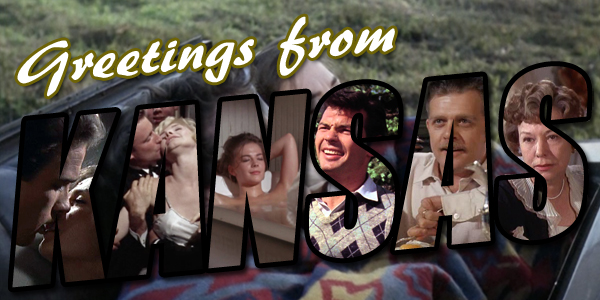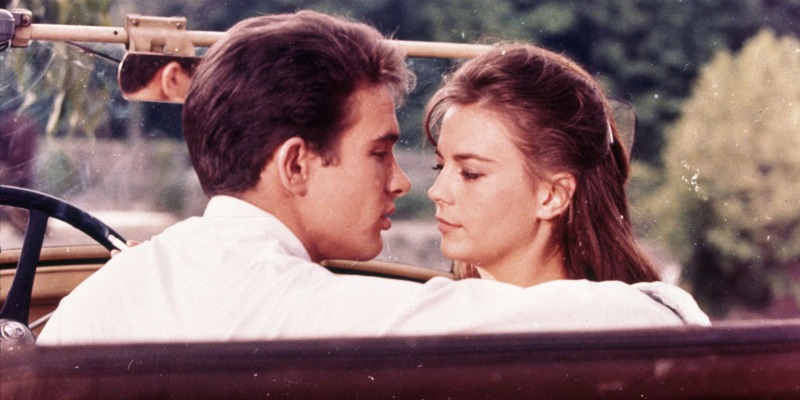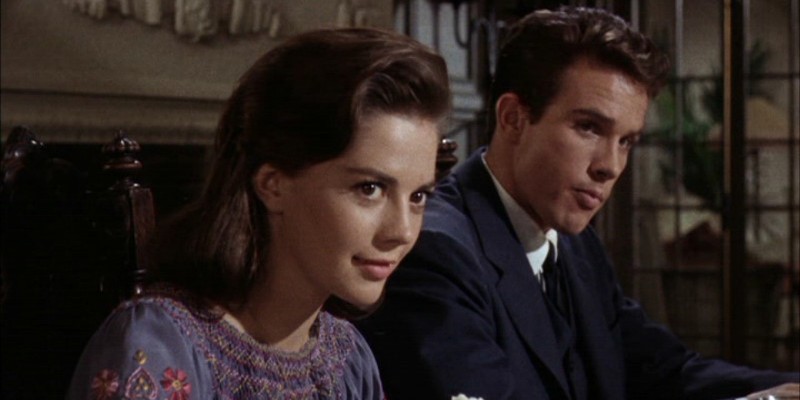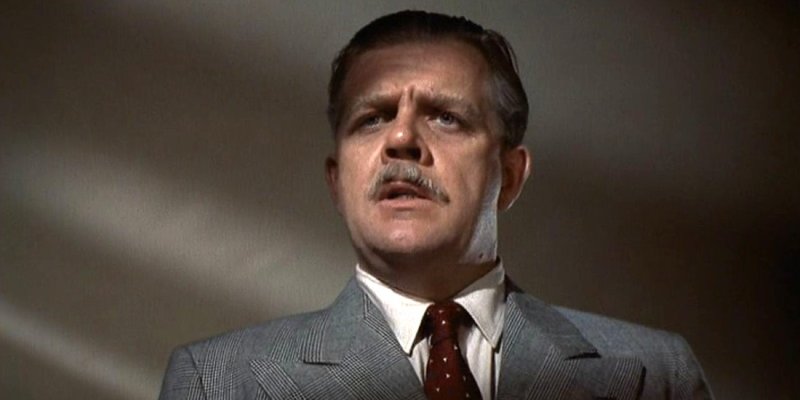
I’ve always wanted to travel across America. I’ve been a few times, to the major tourist attractions – Disneyworld in Florida, Vegas in Nevada, Cheers in Boston – but there’s so many places I’ve never seen in person, and most likely never will. Fortunately, there’s a solution, and it’s my own personal remedy to all life’s problems: movies. There’s been a movie set literally everywhere. Everywhere! So, this feature sees me cinematically visit a new state every week, through a film that was set there. You can read my journey so far here. Next up: Kansas!
When you think Kansas in the movies, I’m guessing you think Wizard of Oz, as in fact do I. However, that’s barely set in Kansas, whereas Splendor in the Grass is almost entirely set there, so wahey.
Wilma Loomis and Bud Stamper (Natalie Wood and Warren Beatty) are high school sweethearts. Wilma is from a low-key family, with a father described as lacking in ambition, and a domineering mother who seems intent on trying to keep her daughter as young as possible. Bud, on the other hand, is son to the richest man in town, who has big plans for his son to mark his name on the world. These varying parenting styles have some pretty intense effects on their children’s livelihoods.
 Splendor in the Grass is a film that doesn’t start well, and heads so far in that direction that around the halfway point I’d written it off as being not for me. To begin with, we get an opening, cringe-worthy scene of the two young lovers alone together in a car with some of the most obvious, and worst, ADR I’ve ever come across, for some really base-level, awkward dialogue as the couple kiss. You never see their mouths moving or anyone actually talking until a little later, but you hear everything said from behind their heads, and it all feels very detached and distant from the off. The acting early on is pretty terrible too, particularly from Wood, who has a tendency to overreact in the most melodramatic ways. When she receives bad news she paws wildly at her pillows in an effort to demonstrate her frustration. Elsewhere, a simple shrug of her shoulders is enough to send Wilma’s classmates into fits of hysterics when she is told off by her teacher for being tardy.
Splendor in the Grass is a film that doesn’t start well, and heads so far in that direction that around the halfway point I’d written it off as being not for me. To begin with, we get an opening, cringe-worthy scene of the two young lovers alone together in a car with some of the most obvious, and worst, ADR I’ve ever come across, for some really base-level, awkward dialogue as the couple kiss. You never see their mouths moving or anyone actually talking until a little later, but you hear everything said from behind their heads, and it all feels very detached and distant from the off. The acting early on is pretty terrible too, particularly from Wood, who has a tendency to overreact in the most melodramatic ways. When she receives bad news she paws wildly at her pillows in an effort to demonstrate her frustration. Elsewhere, a simple shrug of her shoulders is enough to send Wilma’s classmates into fits of hysterics when she is told off by her teacher for being tardy.
Wilma’s mother (Audrey Christie) is concerned about her daughter’s relationship with Bud, or anyone for that matter. As far as Mrs. Loomis is concerned, nice girls don’t even think about “going all the way” with boys, and she never even touched her husband, Wilma’s father, until after they were married, and even then only because “a wife has to, she just lets her husband come near her, in order to get children.” That’s right, this girl is being raised to believe that she shouldn’t want, or even think about anything even close to sex, but once she’s married she has to do everything her husband wishes. Or, as I wrote in my notes, “Holy shit balls.” It’s worth noting that Mrs. Loomis is also a far more dominant force than her husband is. Bud, on the other hand, suffers from the ambitions of his father, Ace Stamper (Pat Hingle), to send him off to Yale. His sister Ginny (Barbara Loden) is deemed a failure in life, so all the family’s hopes are on Bud to carry on the family’s success that his father built up from nothing. Bud, however, would much rather settle down on a ranch with Wilma and live a happy, simple existence. Ace apparently has no problem with Wilma and her family, but he warns his son that is he were to get a girl pregnant, he’d have to do the decent thing and marry her, so he should be careful in case he force himself into a bind with a lower class family. It’s very heavily implied that Ace would much rather Bud be running around with hookers getting his end away than even considering settling down at such a young age. So it’s safe to say that these two lovebirds aren’t exactly pleasing their parents by spending a considerable amount of time together.
 Most of my concerns with the first half, other than the ridiculous plans their parents set upon them, are the characters of Bud and Wilma, and how irritating they are. In movies it’s quite common for younger characters to make grand gestures and poor decisions based around the motive of being in love, and here this is very much the case. Wilma gets annoyed when Bud talks to another girl at school (who would fit the description of someone his father would rather he be spending time with), causing Bud to get annoyed that Wilma is annoyed, and so the spiral continues. Later, whilst kissing at Wilma’s house, Bud forces her onto her knees and makes her tell him she loves him, and will do anything for him, causing her to collapse into tears. Apparently he was kidding, but it’s clear that this encounter deeply affects Wilma’s mindset. You see, the film turns itself around when we discover (kind of spoiler alert that might make you now be interested to see the film) Wilma has become a little bit crazy, and needs to be institutionalised until she recovers from her obsessive love of Bud. That’s right, this film takes the position that, in all those other movies where the girl becomes infeasibly besotted with a guy, she’s probably a little bit nuts. And I love that. Soppy teenage love stories irk the heck out of me, so seeing one take a little spin on that makes me really quite happy.
Most of my concerns with the first half, other than the ridiculous plans their parents set upon them, are the characters of Bud and Wilma, and how irritating they are. In movies it’s quite common for younger characters to make grand gestures and poor decisions based around the motive of being in love, and here this is very much the case. Wilma gets annoyed when Bud talks to another girl at school (who would fit the description of someone his father would rather he be spending time with), causing Bud to get annoyed that Wilma is annoyed, and so the spiral continues. Later, whilst kissing at Wilma’s house, Bud forces her onto her knees and makes her tell him she loves him, and will do anything for him, causing her to collapse into tears. Apparently he was kidding, but it’s clear that this encounter deeply affects Wilma’s mindset. You see, the film turns itself around when we discover (kind of spoiler alert that might make you now be interested to see the film) Wilma has become a little bit crazy, and needs to be institutionalised until she recovers from her obsessive love of Bud. That’s right, this film takes the position that, in all those other movies where the girl becomes infeasibly besotted with a guy, she’s probably a little bit nuts. And I love that. Soppy teenage love stories irk the heck out of me, so seeing one take a little spin on that makes me really quite happy.
However, this one little third act spin isn’t enough to save all the characters. There’s a lot of guys who seem to spend their time at parties waiting for a girl (in this case Bud’s sister Ginny) to come along and say “Take me away from all this,” which of course is code for “I’m drunk, why not rape me in the back of that car, in front of all these other ecstatic, leering men; maybe they can go next!” That being said, there’s still a lot to like about the film. Outside real-life factors affect the plot, which is very pointedly set in 1928, so take a guess as to what happens to old Ace Stamper’s riches come late ’29. In fact, Ace’s arc may be the most layered in the film; coming to terms with the idea that money can’t solve every problem as he writes a blank cheque to a doctor in a moment of need, expecting some medical miracle to occur based on the number of zeroes on the bottom line. At times the character of Mrs. Loomis seemed almost like a passive aggressive pantomime villain, all smiles and concern on the surface, but if you just listen to her words and seen the coldness in her smile you’ll realise she may well be the devil in disguise. Similarly, Wilma is a bit of a wet fish for much of the film, but that’s exactly what her character needs to be. The acting is eventually good all round, particularly Hingle as Ace and Wood as Wilma, the latter of whom was Oscar nominated for her performance. Beatty, in his first film role, was presumably cast because of the similarities between his jaw line and an anvil, but he does well too.
At times the character of Mrs. Loomis seemed almost like a passive aggressive pantomime villain, all smiles and concern on the surface, but if you just listen to her words and seen the coldness in her smile you’ll realise she may well be the devil in disguise. Similarly, Wilma is a bit of a wet fish for much of the film, but that’s exactly what her character needs to be. The acting is eventually good all round, particularly Hingle as Ace and Wood as Wilma, the latter of whom was Oscar nominated for her performance. Beatty, in his first film role, was presumably cast because of the similarities between his jaw line and an anvil, but he does well too.
All in all, what started out looking like a generic, mediocre, silly melodrama discovered it had some balls and pulled out a solid, interesting story, with decent characters and interesting developments. It’s by no means a must-see, but it was at least better than I initially thought.

